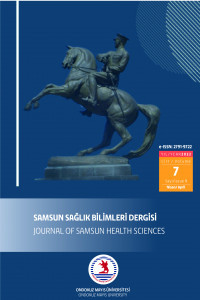Pandemi Hastanesinden Taburcu Olan Hastaların Eve Uyum Deneyimleri ve Bakım İhtiyaçları
pandemi, COVID-19, Yatan hasta, Bakım ihtiyacı, Eve uyum
ADAPTATION TO HOME EXPERIENCES AND CARE NEEDS OF PATIENTS DISCHARGED FROM THE PANDEMIC HOSPITAL
Pandemic, COVID-19, Inpatient, Needforcare, Home Adaptation,
___
- Argüder, E., Kılıç, H., Civak, M., Kacar, D., Kaya, G., Yılmaz, A., Karalezli, A. (2020). Anxiety and Depression Levels in Hospitalized Patients due to Covid-19 Infection. Ankara Medical Journal, 20(4), 971–981. doi:10.5505/amj.2020.80775
- Ayakdaş Dağlı, D., Büyükbayram, A. ve Baysan Arabaci, L. (2020). COVID-19 Tanısı Alan Hasta ve Ailesine Psikososyal Yaklaşım. İzmir Kâtip Çelebi Üniversitesi Sağlık Bilimleri Fakültesi Dergisi, 5(2), 191–195.
- Benli, A., Resuloğlu, E., Karadağlı, İ., Ceylan, A. N., Yeler, M. T., Danışan, G., … Yaşar, C. (2021). Evaluation of the Characteristics and Clinical Results of the Patients Hospitalized With Covid-19 Pneumonia in the Province of Mus: a State Hospital Experience. İstanbul Tıp Fakültesi Dergisi, 84(2), 149–157. doi:10.26650/iuitfd.2021.812574
- Brooks, S. K., Webster, R. K., Smith, L. E., Woodland, L., Wessely, S., Greenberg, N. and Rubin, G. J. (2020). The psychological impact of quarantine and how to reduce it: rapid review of the evidence. The Lancet, 395(10227), 912–920. doi:10.1016/S0140-6736(20)30460-8
- Carfì, A., Bernabei, R. and Landi, F. (2020). Persistent Symptoms in Patients After Acute COVID-19. JAMA, 324(6), 603–605. doi:10.1001/jama.2020.12603
- Cetin, A., Gokcek, M. B., Aslaner, H., Erten, Z. K. and Ozcakir, A. C. (2022). Post-discharge evaluation of patients with Covid-19 infection. Family Practice & Palliative Care, 7(2), 7–12.
- Elkan, M., Dvir, A., Zaidenstein, R., Keller, M., Kagansky, D., Hochman, C. and Koren, R. (2021). Patient-reported outcome measures after hospitalization during the covid-19 pandemic: A survey among covid-19 and non-covid-19 patients. International Journal of General Medicine, 14, 4829–4836. doi:10.2147/IJGM.S323316
- Fluck, D., Rankin, S., Lewis, A., Robin, J., Rees, J., Finch, J., … Han, S. (2021). Comparison of characteristics and outcomes of patients admitted to hospital with COVID - 19 during wave 1 and wave 2 of the current pandemic. Internal and Emergency Medicine, 1(10). doi:10.1007/s11739-021-02842-5
- Goda, K., Kenzaka, T., Yahata, S., Kumabe, A., Katsurada, M. and Nishisaki, H. (2021). Changes in patients’ outlook, behaviors, and attitudes toward COVID-19 after hospitalization and their experiences of discrimination and harassment. BMC Research Notes, 14(1), 10–15. doi:10.1186/s13104-021-05780-9
- He, J., He, L., Zhou, W., Nie, X. and He, M. (2020). Discrimination and social exclusion in the outbreak of COVID-19. International Journal of Environmental Research and Public Health, 17(8), 17–20. doi:10.3390/ijerph17082933
- Hu, J., Zhang, Y., Xue, Q., Song, Y., Li, F., Lei, R., … Qian, J. (2021). Early Mental Health and Quality of Life in Discharged Patients With COVID-19. Frontiers in Public Health, 9(725505), 1–8. doi:10.3389/fpubh.2021.725505
- Huang, C., Huang, L., Wang, Y., Li, X., Ren, L., Gu, X., … Cao, B. (2020). 6-month consequences of COVID-19 in patients discharged from hospital: a cohort study. Lancet, 397, 220–31.
- Kartal, H., Kaymak, A. ve Günen, M. (2021). Covid- 19 tanısı alan hastaların sosyo- demografik özelliklerine yönelik semptomlarının incelenmesi. Sağlık ve Yaşam Bilimleri Dergisi,3(2), 126–132. doi:10.33308/2687248X.202132219
- Luo, M., Guo, L., Yu, M., Jiang, W. and Wang, H. (2020). The psychological and mental impact of coronavirus disease 2019 (COVID- 19) on medical staff and general public – A systematic review and meta- analysis. Psychiatry Research journal, 291(113190). doi:10.1016/j.psychres.2020.113190
- Qi, M., Zhou, S. J., Guo, Z. C., Zhang, L. G., Min, H. J., Li, X. M. and Chen, J. X. (2020). The Effect of Social Support on Mental Health in Chinese Adolescents During the Outbreak of COVID-19. Journal of Adolescent Health, 67(4), 514–518. doi:10.1016/j.jadohealth.2020.07.001
- Qin, E. S., Gold, L. S., Hough, C. L., Katz, P. P., Bunnell, A. E., Wysham, K. D. and Andrews, J. S. (2021). Patient-reported functional outcomes 30 days after hospitalization for COVID-19. PM & R : the journal of injury, function, and rehabilitation, 1–9. doi:10.1002/pmrj.12716
- Samancı, M. (2020). Küresel Bir Salgın: Covid-19. Samsun Sağlık Blimleri Dergisi, 5(1), 151–156.
- Sandalcı, B., Uyaroğlu, O. A. ve Sain Güven, G. (2020). COVID-19’da Kronik Hastalıkların Rolü, Önemi ve Öneriler. Flora the Journal of Infectious Diseases and Clinical Microbiology, 25(2), 132–138. doi:10.5578/flora.69700
- Saraçoğlu, E. ve Avcı, İ. A. (2021). Diyabet Hastalarının Covid-19 Salgınıyla İlgili Endişelerinin Ve Bakım İhtiyaçlarının Belirlenmesi. Turkish Journal of Diabetes and Obesity, 5(2), 202–209. doi:10.25048/tudod.901442
- Sudre, C. H., Lee, K. A., Lochlainn, M. N., Varsavsky, T., Murray, B., Graham, M. S., … Ourselin, S. (2021). Symptom clusters in COVID-19: A potential clinical prediction tool from the COVID symptom study app. Science Advances, 7(12), 1–8. doi:10.1126/sciadv.abd4177
- Teker, A. G., Emecen, A. N., Girgin, S., Simsek-Keskin, H., Siyve, N., Sezgin, E., … Ünal, B. (2021). Türkiye ’ de Bir Üniversite Hastanesinde COVID-19 Olgularının Epidemiyolojik Özellikleri. Klimik Dergisi, 34(1), 61–68. doi:10.36519/kd.2021.11
- Weerahandi, H., Hochman, K. A., Simon, E., Blaum, C., Chodosh, J., Duan, E., … Horwitz, L. I. (2021). Post-Discharge Health Status and Symptoms in Patients with Severe COVID-19. Journal of General Internal Medicine, 36(3), 738–745. doi:10.1007/s11606-020-06338-4
- Yavuz, M. Y. ve Anar, C. (2021). COVID-19 Sonrası Devam Eden Semptomlar, İnterstisyel Akciğer Hastalığı Oluşumu ve Takip Süreci. İzmir Göğüs Hastanesi Dergisi, 35(2), 53–65. doi:10.5222/IGH.2021.00719
- Yayın Aralığı: Yılda 3 Sayı
- Başlangıç: 2021
- Yayıncı: Ondokuz Mayıs Üniversitesi
ÜÇ FARKLI KRONIK HASTALIĞI OLAN HASTALARINDA YAŞAM KALITESI VE KONFOR DÜZEYLERININ KARŞILAŞTIRILMASI
Ümmühan AKTÜRK, Behice ERCİ, Gül DURAL
HEMŞİRELERİN COVID-19 TANILI HASTALAR İLE ÇALIŞMAYA İLİŞKİN GÖRÜŞLERİ VE YAŞADIKLARI ZORLUKLAR
Canan SARI, Leyla ADIGÜZEL, Birsel Canan DEMİRBAĞ
Cilt Bakımında ve Vücut Banyosunda Kullanılan Klorheksidinin Etkisi: Sistematik Derleme
Nazmiye UĞUR, Meryem Türkan IŞIK
ÜRODİNAMİ KAYNAKLI AĞRI VE ANKSİYETENİN KONTROLÜNDE AROMATERAPİNİN ETKİSİ
Elife KETTAŞ DÖLEK, Gülay ALTUN UĞRAŞ
Yaşlı Cerrahi Hastaları ve Kırılganlık Sendromu
Hemşire ve Ebelerin Kadınlara Pelvik Kas Egzersizi Öğretimine Yönelik Uygulamaları
Cansu KARADENİZ BENLİ, Nedime Gül DOĞAN ÖZDEMİR, Özen KULAKAÇ
Aslihan AKSU, Aysu BULDUM, Filiz DEĞİRMENCİ, Duygu VEFİKULUÇAY YILMAZ
Kronik Hastalığa Sahip Bireylerin Hastalığa Uyumunun Yaşam Kalitesi ile İlişkisi
